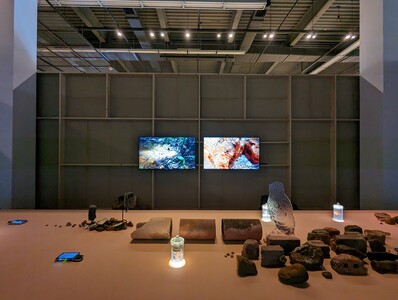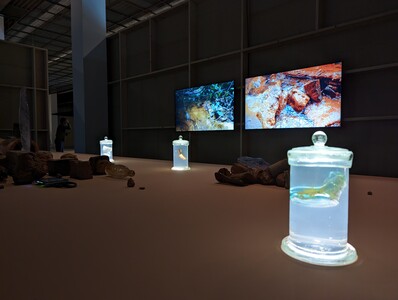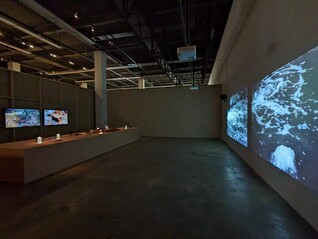Group Exhibition Gwangju Biennale Exhibition Hall, Gwangju, South Korea
The 14th Gwangju Biennale, soft and weak like water, takes its inspiration from a chapter of Dao De Jing, a fundamental Daoist text, which speaks of water’s capacity to embrace contradictions and paradoxes. The Biennale proposes to imagine our shared planet as a site of resistance, coexistence, solidarity, and care, by thinking through the transformative and restorative potential of water as a metaphor, a force, and a method. It invites artists to engage with an alternative model of power that brings forth change, not with an immediate effect but with an endurance and pervasive gentleness that flows across structural divisions and differences.
Led by Sook-Kyung Lee, the Biennale will bring together around 80 artists from different corners of the globe and explore its theme through four subtopics: Luminous Halo positions the spirit of Gwangju as a source of inspiration and model for resistance and solidarity; Ancestral Voices highlights transnational artistic approaches for engaging and interpreting traditions to question and challenge modernist ideas; Transient Sovereignty considers the ways in which post-colonial and de-colonial artistic thinking have developed in relation to issues such as migration and diaspora; and Planetary Times explore the limits and potentials of a ‘planetary vision’ on ecological and environmental justice.
Aspiring to understand seemingly disparate yet equally urgent global issues as one entanglement that affects the whole planet and its inhabitants, soft and weak like water gives prominence to voices that speak about systems and practices of knowledge as alternatives to the ones governed by modernist thinking. Ranging from traditional healing, community-based and collective creation to reinterpretation of indigenous crafts, the Biennale presents discourses and practices that highlight ways of existing together, which help locate solidarity in both our affinities and our singularities.
Robert Zhao Renhui’s multimedia practice concentrates on the various ways in which humans interact with the natural world, which he refers to as the ‘zoological gaze’. For the 14th Gwangju Biennale, Zhao presents Trying to Remember a River 2023, an installation that consists of videos displayed across four channels, a soundscape, and a collection of objects. As a whole, the installation engages with the life and history of an ancient and unnamed river tributary in Singapore that was transformed into a concrete drain in the early 20th century. The videos feature Zhao’s footage of wildlife in the land that surrounds the river, which started appearing as the drain has slowly fallen into disuse over the past thirty years, interspersed with texts that provide context to the history of the river. Along with the selection of objects found near the river, the installation stages an attempt to trace the multiple layers of its history and ecology.
More Pictures:









